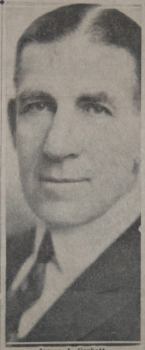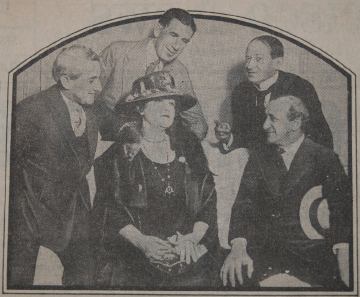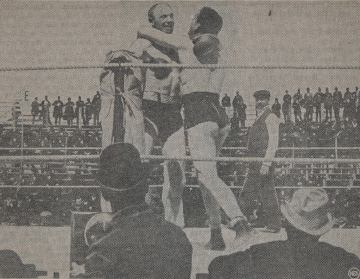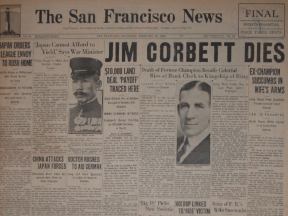|
Special to The News
_
BAYSIDE, N.Y., Feb. 18. - The
death today of James J. Corbett
ended one of the most colorful
careers the fight industry has ever
known.
_
"Gentleman Jim's" life was onne of
contrasts.
_
Mr. Corbett's father, a livery stable
keeper, had intended his boy for the
priesthood "or some genteel business
like banking." Instead he became
"Gentleman Jim" - the colorful
heavyweight prize ring champion of
the world who boasted he "could lick
any man in the world."
_
Mr. Corbett was destined to be-
come a champion who could pound
the mighty John L. Sullivan to the
floor, but he also was to introduce a
new chapter in the history of prize
fighting. His refinement and his
efforts "set an exaple" for Ameri-
can youths and made him a unique
and towering figure in the history
of a sport which previously had been
in disrepute in America.
_
The boy begain boxing when he
was 12 years old - in school yards
from which he was twice ecpelled;
in livery stables and in firehouses.
_
In the early 80s, which he was
obediently trying to become "a gen-
teel banker," Mr. Corbett joined the
Olympic Club and took his first
boxing lessons. In four years he had
advanced to be the first middleweight
and then heavyweight amateur
champion of the club.
_
It was Jack Dempsey (the Nonpa-
reil) who gave Mr. Corbett the
thought that he "could lick any man
in the world." A practice bout with
Dempsey - 30 minutes without an
interruption or rest - showed the
youth, who then weighed 160 pounds,

James J. Corbett
|
that he could stay with the cleverest
boxer of the day.
_
The entire west - wilder than it is
today, although the fighters had to
cross state lines, fight in barns and
sometimes on boats in order to
escape the law - rose in admiration
when Mr. Corbett settled an ancient
grudge with Joe Choynski, in a fight
on a barge at Benicia. Choynski
wore skin-tight gloves, "having lost
hi own pair." Corbett wore five-
ounce gloves, and fought with a bro-
ken thumb through 28 rounds, finally
to knock out his opponent with the
left hook he had perfected.
_
Later came his historic fight with
Peter Jackson. A few words, Mr.
Corbett's own, furnish a fitting de-
scription of the match; "In the 50th
round I loosed a left-hand hook as
Jackson was letting the right go for
my head... That is the only inci-
dent of the 10 periods from the 50th
to the 60th that I regard as impor-
tant." And in the 61st round the
referee called the bout "no contest,"
three seconds before Jackson col-
lapsed from sheer exhaustion.
_
shortly after this fight, John L.
Sullivan, touring the country in his
play, "Honesy Hearts and Willing
Hands," met Mr. Corbett in an ex-
hibition bout on a San Francisco
stage. Mr. Corbett decided to fight
the most aggressive, hard-hitting
champion America had ever seen.
_
In 1892 the match was arranged,
and sportsmen the nation over, in-
cluding Mr. Corbett's friends, bet
heavily on the Boston strong boy.
The match, in New Orleans, was the
first ever arranged under the pro-
tection of the police.
_
Mr. Corbett fought cautiously dur-
ing the early rounds of that fight,
yet in the third round he had suc-
ceeded with five blows in breaking
the bigger man's nose.
_
In the 21st round, with Sullivan
badly worried, Mr. Corbett followed
home a left hook with a smacking
hard right to the jaw, and an ex-
world's champion rolled on the floor.
The betting had been 5 to 1 against
Mr. Corbett.
_
That night, while his friends were
celebrating with champagne, Mr.
Corbett drank milk, and a new leg-
end was established. "He drinks
milk because he wants to set an ex-
ample to boys," the amazed sport-
ing world learned.
_
For five years Mr. Corbett reigned
as undisputed champion, and con-
tinued to build up the "Gentleman
Jim" reputation that was his whole-
some pride. He gressed well - like
the banker he might have become.
He strove for an appearance of cul-
ture and refinement, and, having
set himself an ideal, tried to live
up to it. He was a new type of
champion.
_ _ _ _ Loses Title
_ In
1894 Mr. Corbett appeared as
an actor in "Gentleman Jim" at the
Drury Lane Theater in London.
Henceforth he was to divide his
interests between the ring and the
stage. He had an unusual trait in
prizefighters, a good actor. Even
other actors admitted it.
_
In 1897 he lost his heavyweight
championship to Bob Fitzsimmons
in a moment of what he termed
"accidental carelessness." The knock-
out punch was a blow in the pit of
the stomach, and the "solar plexas
punch" became a phrase known
from one end of the country to th
other. He was never again able to
regain the title.
|




